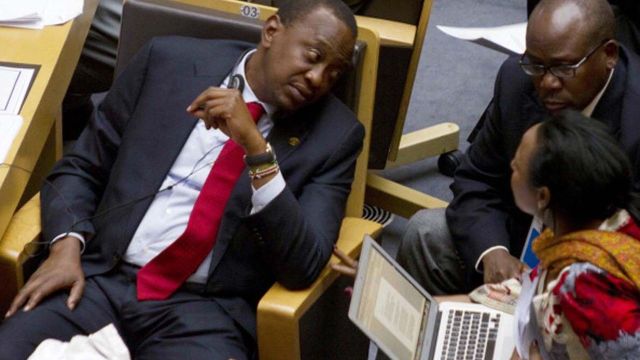
Kenyan President Uhuru Kenyatta (right) speaks with Kenyan Attorney General Githu Muigai and Foreign Minister Amina Mohamed (Photo: Getty)
The International Criminal Court (ICC) was established under the Rome Statute of 1998 as the first international legal body with jurisdiction to prosecute genocide, crimes against humanity and war crimes. African governments enthusiastically joined the Court and formed the largest regional bloc of member states (34 of 124), sensing its potential to transcend global power politics. But during the first 14 years of the ICC’s existence, the Court intervened exclusively in African states. With respect to Darfur in 2005 and Libya in 2011, the body targeted heads of state for mass atrocities at the behest of the United Nations Security Council (UNSC) – an institution whose permanent, veto-wielding members include three states (the United States, Russia and China) that have not joined the ICC. The ICC also investigated the future president and deputy president of Kenya for alleged atrocities committed during the 2007–08 post-election violence, although the ICC’s cases against them collapsed. For many, the Court’s record gave the impression of an institution that was focusing inordinately and prejudicially on African states. In late 2016, Burundi, South Africa, and The Gambia decided to begin the process of withdrawing from the ICC. This development has given rise to fears of a mass exodus, and raised the question of whether the ICC could remain a viable institution in Africa.
Tensions between the ICC and some African states have been both overstated and over-simplified. Some African government officials have lambasted the ICC as a ‘neo-colonial’, ‘racist’ and ‘race-hunting’ institution that ‘blackmails’ African states. In response, ICC officials and supporters have often ascribed anti-ICC sentiment to a ‘few bad apples’ – namely, African dictators and despots afraid of the ICC’s scrutiny. While there certainly are African autocrats who loudly oppose the ICC, there are also subtler, multi-faceted aspects of the Court’s activity in the region. The fact that it took 14 years for the ICC to investigate a situation outside the African continent reinforces perceptions of anti-African bias. Yet the majority of the African situations under ICC investigation were referred to the Court by the African state in question, and all cases involved alleged international crimes of sufficient gravity to merit ICC attention for which there were no prospects of domestic accountability. Some governments, like Uganda and the Democratic Republic of the Congo (DRC), have benefited from the ICC’s having targeted their political adversaries.
…
The possibility of developing alternative institutions capable of prosecuting international crimes has gained traction in Africa. Central to this idea is the potential creation of an African Court of Justice, Human and Peoples’ Rights with a mandate to prosecute the same crimes, among others, as are currently under the jurisdiction of the ICC. Such an expansion would be achieved by the ratification of the so-called Malabo Protocol, an agreement drafted by the Pan African Lawyers’ Union, which is impressive in its breadth and depth. Although Bensouda has welcomed such a development, not a single African state has ratified the Protocol. There is also disagreement over how such an institution would be funded and concern about the possibility that any expansion of the African
Court would include immunity not only for sitting heads of state but government officials in general.
Other developments on the continent, however, do suggest growing expertise and interest in international criminal justice. In 2008, Uganda set up the International Crimes Division, which is now hearing its first war crimes case. Kenya has consistently declared that it would create a similar institution, the International and Organised Crimes Division, although it would not examine any alleged atrocities perpetrated during the 2007–08 post-election violence that spurred the ICC to intervene. Hybrid tribunals – courts that combine international and domestic elements and staff – are reportedly ‘in the pipeline’ in the Central African Republic and South Sudan. In Senegal, the Extraordinary African Chambers has prosecuted and convicted former Chadian president Hissène Habré for crimes against humanity.
Any discussion of ‘alternatives’ to the ICC should take into account the reality that most ICC member states in Africa have been unwilling to rescind their membership to the Court. There is a need to address how these alternative would interact in a cooperative arrangement with the ICC in the service of a coherent system of global justice. One reasonable proposal in this regard would be, as requested by African member states of the ICC, to alter the preamble of the Rome Statute to describe the Court as complementary to regional as well as national institutions.
The full article can be found here.

